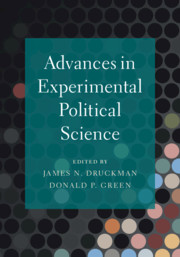Book contents
- Frontmatter
- Contents
- List of Figures
- List of Tables
- List of Boxes
- List of Contributors
- Acknowledgements
- 1 A New Era of Experimental Political Science
- Part I Experimental Designs
- Part II Experimental Data
- Part III Experimental Treatments and Measures
- Part IV Experimental Analys is and Presentation
- Part V Experimental Reliability and Generalizability
- Part VI Using Experiments to study Identity
- Part VII Using Experiments to Study Government Actions
- 27 Experiments on and with Street-Level Bureaucrats
- 28 The State of Experimental Research on Corruption Control
- 29 Experiments on Political Activity GovernmentsWant to Keep Hidden
- 30 Experiments in Post-Conflict Contexts
- 31 Experiments on Problems of Climate Change
- 32 A Constant Obsession with Explanation
- Author Index
- Subject Index
30 - Experiments in Post-Conflict Contexts
from Part VII - Using Experiments to Study Government Actions
Published online by Cambridge University Press: 08 March 2021
- Frontmatter
- Contents
- List of Figures
- List of Tables
- List of Boxes
- List of Contributors
- Acknowledgements
- 1 A New Era of Experimental Political Science
- Part I Experimental Designs
- Part II Experimental Data
- Part III Experimental Treatments and Measures
- Part IV Experimental Analys is and Presentation
- Part V Experimental Reliability and Generalizability
- Part VI Using Experiments to study Identity
- Part VII Using Experiments to Study Government Actions
- 27 Experiments on and with Street-Level Bureaucrats
- 28 The State of Experimental Research on Corruption Control
- 29 Experiments on Political Activity GovernmentsWant to Keep Hidden
- 30 Experiments in Post-Conflict Contexts
- 31 Experiments on Problems of Climate Change
- 32 A Constant Obsession with Explanation
- Author Index
- Subject Index
Summary
Experiments are increasingly used to better understand various aspects of civil conflict. A critical barrier to peace is often conflict recurrence after a settlement or other attempt to end fighting between sides. This chapter examines the growing literature on experiments in post-conflict contexts to understand their contributions and limitations to our understanding of the dynamics in this period. It argues that work on post-conflict contexts takes two different perspectives: a peace stabilization approach emphasizes special problems from civil conflict, including how to sustain peace agreements, while a peace consolidation approach emphasizes problems common to statebuilding, including how to reconstruct communities. Both seek in part to prevent conflict recurrence, though, and that is the focus of this chapter. Although more existing theory links stabilization programs with enduring peace, more existing experiments examine consolidation programs. Both approaches would benefit from new work. Post-conflict contexts in general, however, are difficult environments in which to work, and so experiments face three interrelated challenges: first, these contexts present special ethical challenges due to both the high stakes of peace and the sensitivity of subjects; second, these are complex treatments often conducted simultaneously by different actors, and these are treatments that depend on both institutional change and behavioral responses, so change is the constant in these contexts; and, third, these contexts also face heterogeneity in terms of programs but also contexts that mean the lessons may not travel even among post-conflict settings. Despite these challenges, experiments in post-conflict contexts hold promise for advancing our understanding of enduring peace.
Keywords
Information
- Type
- Chapter
- Information
- Advances in Experimental Political Science , pp. 562 - 591Publisher: Cambridge University PressPrint publication year: 2021
Accessibility standard: Unknown
Why this information is here
This section outlines the accessibility features of this content - including support for screen readers, full keyboard navigation and high-contrast display options. This may not be relevant for you.Accessibility Information
- 4
- Cited by
